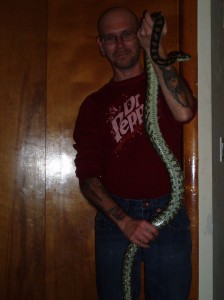Frank Indiviglio
516-382-2432
13 August 2012
Review, Herpetoculture House Magazine, V2, I4
Frank Indiviglio, a herpetologist, zoological park consultant, and author of 5 books, has recently retired from a career of over 20 years with the Bronx and Staten Island Zoos. Frank writes and manages ThatReptileBlog http://bitly.com/Ksb7pY, where he addresses amphibian, invertebrate, and reptile conservation, natural history and captive care, and answers readers’ questions pertaining thereto. His bio is posted at http://bitly.com/LC8Lbp.
I must admit to a bit of hesitation upon being asked to review Herpetoculture House Magazine. As a career herpetologist and lifelong herpetoculturist, I view the explosion of interest in my field with both admiration and skepticism. On the one hand, wonderful books and magazines have been published in recent years, and these are much appreciated by those of us who grew up scouring libraries and used bookstores for the works of Raymond Ditmars and the other legendary authors. However, the current prevalence of often poorly-researched and hastily-published books and internet material is very disheartening. Even in well-respected zoos, where I have spent much of my career, the quality of the entry-level staff often leaves something to be desired (although there are, happily, many serious young people about as well). Continue reading




 keepers of all persuasions to find themselves all of a sudden in contravention of the law, as new municipal, state/provincial and federal regulations are drafted to control our hobby. This is sometimes understandable with the regulation of dangerous exotics, but in some places like my township near Ottawa, Canada, all reptiles, amphibians and arachnids are banned outright! I believe personally that a prospective owner should have to prove their competence in order to keep an animal that could harm someone, or an animal that could be invasive to the local environment if escaped or released. They should have to keep and maintain a license for as long as they have such animals and I think that’s only fair. However, there is nothing dangerous or invasive about keeping a leopard gecko in Canada!
keepers of all persuasions to find themselves all of a sudden in contravention of the law, as new municipal, state/provincial and federal regulations are drafted to control our hobby. This is sometimes understandable with the regulation of dangerous exotics, but in some places like my township near Ottawa, Canada, all reptiles, amphibians and arachnids are banned outright! I believe personally that a prospective owner should have to prove their competence in order to keep an animal that could harm someone, or an animal that could be invasive to the local environment if escaped or released. They should have to keep and maintain a license for as long as they have such animals and I think that’s only fair. However, there is nothing dangerous or invasive about keeping a leopard gecko in Canada!